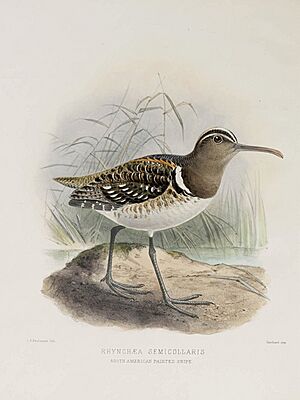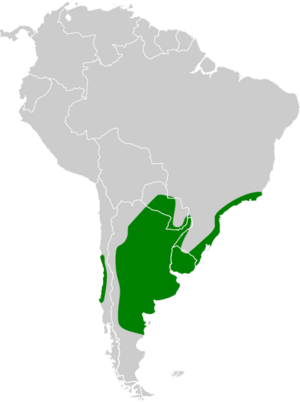South American painted-snipe facts for kids
Quick facts for kids South American painted-snipe |
|
|---|---|
 |
|
| Conservation status | |
| Scientific classification |
|
| Kingdom: | Animalia |
| Phylum: | Chordata |
| Class: | Aves |
| Order: | Charadriiformes |
| Family: | Rostratulidae |
| Genus: | Nycticryphes Wetmore & Peters, 1923 |
| Species: |
N. semicollaris
|
| Binomial name | |
| Nycticryphes semicollaris (Vieillot, 1816)
|
|
 |
|
| Script error: The function "autoWithCaption" does not exist. | |
| Synonyms | |
|
|
Script error: No such module "Check for conflicting parameters".
The South American painted-snipe (Nycticryphes semicollaris) is a special type of bird. It is also known as the lesser painted-snipe. This bird is a shorebird, meaning it lives near water. It belongs to the family Rostratulidae. There are only two other birds in its family: the Australian painted-snipe and the greater painted-snipe.
Contents
About the South American Painted-Snipe
This bird has a unique look. Its head and neck are a dark red-brown color. It has a bright yellow stripe on top of its head. The upper part of its body is dark grey-brown with white spots. Its belly and chest are white.
How to Identify This Bird
Unlike many other bird species, male and female South American painted-snipes look very similar. This is called not being "sexually dimorphic." It means you can't easily tell them apart just by looking at their feathers. The female might be a little bigger and brighter, but the difference is small.
This bird has a long, curved bill that points downwards. It also has webbed feet, which helps it swim. This is different from other painted-snipes. These birds are about 19 to 23 centimeters (7.5 to 9 inches) long. They weigh between 65 and 86 grams (2.3 to 3 ounces).
Sounds and Calls
When these birds are in captivity, they have been heard making a rough, hissing sound. It sounds like "wee-oo."
Where These Birds Live
The South American painted-snipe lives in the southern part of South America. You can find them in countries like southern Brazil, Paraguay, Uruguay, Chile, and Argentina.
Preferred Homes and Habitats
These birds like to live in wet, low-lying areas. They prefer freshwater wetlands, which include wet grasslands. These places provide the perfect environment for them to find food and build nests.
Life and Habits of the Painted-Snipe
South American painted-snipes have interesting behaviors. They are known for how they find food and raise their young.
Reproduction and Family Life
These painted-snipes are usually monogamous, meaning one male and one female stay together. They also breed in groups, which is called semi-colonial breeding. They build their nests on the ground in wetlands. The nest is a shallow cup shape. A female usually lays 2 to 3 eggs at a time. They mostly breed from July to February.
What They Eat
The South American painted-snipe eats both plants and animals, making it an omnivore. They use their long bills to search for food in mud and shallow water. They look for small animals and seeds. They often feed around dusk, which is when the sun begins to set.
Conservation Status
For a long time, people in Chile and Argentina hunted the South American painted-snipe. It was seen as a good bird for hunting.
Threats and Protection Efforts
Even though it lives across a wide area, this bird is not very common. Its home, the wetlands, is sometimes drained or damaged by human activities. This could be a threat to the birds. However, there hasn't been a big drop in their numbers that we know of. Because of this, their conservation status is currently listed as "Least Concern." This means they are not considered to be in danger of extinction right now.
 | James Van Der Zee |
 | Alma Thomas |
 | Ellis Wilson |
 | Margaret Taylor-Burroughs |


